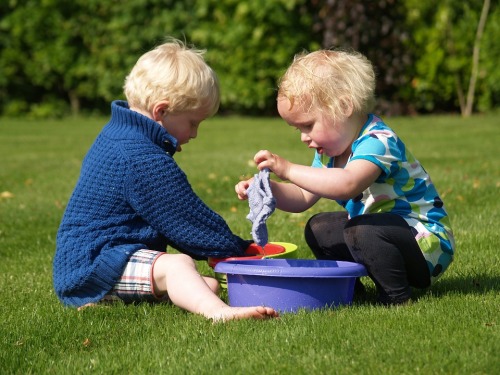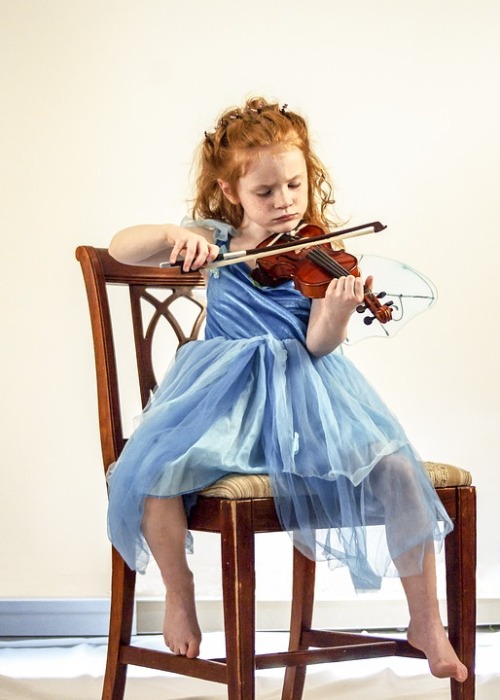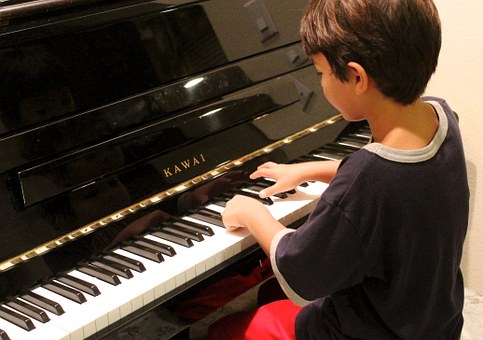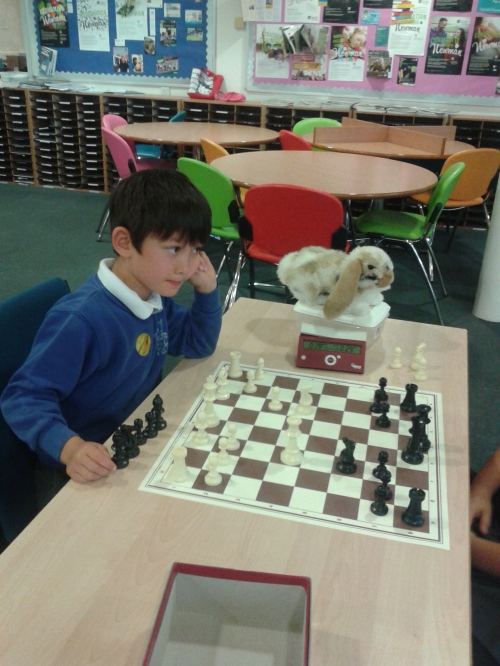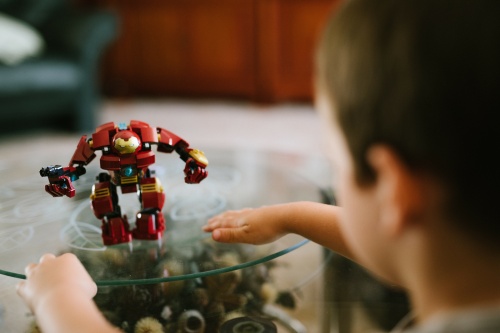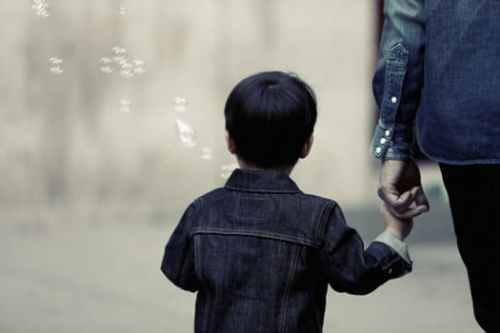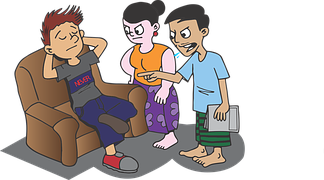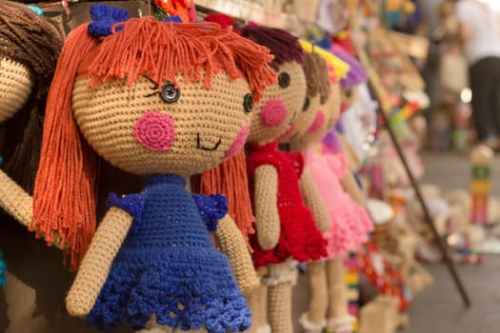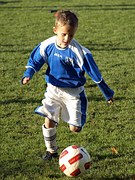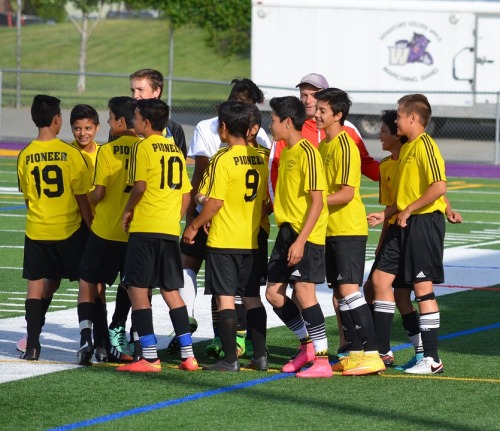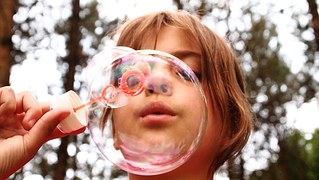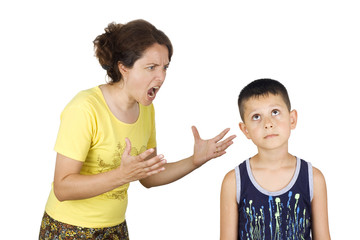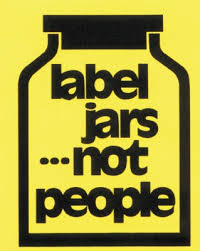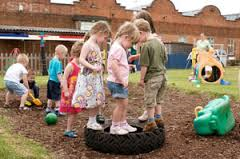
Developing social skills and empathy
Parents can improve their child’s peer relationships by teaching them basic social skills. One study found that children who had more conversations with their parents about friendships were better liked by other children (Laird, Pettit, Mize and Lindsey, 1994).
The following techniques can be used to develop social skills:
1) Teach your child to recognise facial expressions. Use the internet to find images of facial expressions or cut out old pictures from magazines and ask your child what expression the person is showing.
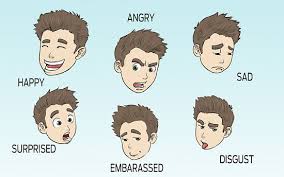
2) Ask your child to use people’s names to get their attention but explain to them that they should to wait until the person has finished their conversation with another person before interrupting.
3) Explain to them that sometimes people want things at the same time but it is important to take turns. Next time your child is fighting with another child over a toy, use the opportunity to explain to them that they can take turns. Tell them that they can each have the toy for 2 minutes and ask them to decide who should have the toy next.
4) Organise cooperative activities for children such as a building a space station out of Lego or painting a wall mural on a long roll of paper.
5) Teach your child how to be a good winner and loser in a game. Explain to your child that they should not boast when they win a game or taunt people when they are losing as this can make other people feel bad. They also need to know how to lose gracefully without getting angry or upset. Young children find it very hard to lose a game but if parents give their children rewards for good sportsmanship then this takes the emphasis away from winning or losing the game. One study found that children who were taught about good sportsmanship before their PE classes and whose teachers gave them a score for it, were able to resolve disagreements in lessons more easily than children not taught these skills explicitly (Sharpe et al. 1995).
6) Explain to your child about compromise. Ask your child to consider what they would do if they wanted to go to the swimming pool but their friend wanted to go to the cinema or if they wanted to make a banana cake but their sister wanted to make a chocolate cake. Help your child to think about the different possibilities. Children who are able to negotiate and compromise are more popular with peers (Crick and Grotepeter, 1995).
7) Teach your child how to really listen to other people and how to show an interest in other people. Explain to them that they should listen to other people without interrupting them and to try and talk about what the other person is interested in.
8) Get your child to imagine things from a different perspective. Next time they say they are annoyed with a teacher or a friend; ask them to imagine what the other person is thinking. Slaughter and colleagues (2002) suggest that children who are able to recognise other children’s mental states are better liked by peers.
9) Tell your child not to annoy or disrupt other children playing even if they have been told to go way as this will stop the other children wanting to play with them next time. Children are less likely to play with another child if they aggressive or disruptive (Coie, 1990).
10) Explain that people’s thoughts affect their actions. Use scenarios to demonstrate that sometimes people’s thoughts can be wrong. For example, a boy may think his friend doesn’t like him anymore because he does not want to play with him that day but actually his friend just wants to play something different.
11) Whenever your child is unhappy about something, ask them to imagine what other people in similar situations might feel as this is often when empathy is at its greatest. For example, if your child is unhappy about not be chosen for the football team, ask them to imagine what it is like for someone who is not able to play sport at all or who is chosen to play for England but has to sit on the bench the entire season.
12) Ask your child to empathise with others. You can start by asking your child to imagine what the characters on TV or in books might be feeling. If your child talks about a bullying incident at school, ask them to imagine how the different children involved might be feeling.
13) Encourage your child to connect with other children and to look for things they have in common rather than emphasizing differences.
14) Teach your child to say ‘no’ to other children if they don’t like what they are being asked to do and discuss peer pressure with them.
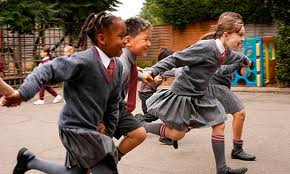
Parents should be aware that friendships change with age: 2-year-old children tend to play on their own although they will observe and copy adults and other children; 3-year-old children play alongside each other and are beginning to share and take turns; 4- to 5-year-old children can play cooperatively with other children, can play games with rules and can form ‘special’ friendships; 6- to 8-year-old children have better conversational skills and are able to negotiate and empathise with their friends; 9- to 12-year-old children have friends with shared interests and are able to respect the opinions of their friends; teenagers tend to have very close friendships based on shared values and appearance (O’Brien and Bierman, 1988).
‘My 5-year-old daughter says that the other children won’t let her play with them at school’
You can teach your daughter the skills to join a group. Use dolls to role play a situation with her. For example, you can represent your daughter’s friends with two dolls and your daughter can be represented by a third doll. Ask your daughter what kind of games they play at school or suggest that the dolls are pretending to be princesses, a popular theme. You can then say that two girls are playing a game together and really enjoying being princesses when a third girl comes along who is not part of their game. Explain to your daughter that the third girl asks to join the game but the other two girls say ‘No, you can’t play.’ Now talk to your daughter about what the third girl could do at this point. The third girl could either walk away and try and play with some other children or she could say ‘I could be a princess too’ as this is what the two girls are already playing. However, the other two girls might say ‘No, you can’t be a princess’. The third girl then has the option to walk away again but she could offer to add to the game by saying ‘I can be the fairy godmother’ or ‘I can be a wicked queen’. Explain to your daughter that it can be easier to join in with other children by adding something different to their game. However, if the two girls still do not want play with the third girl at this point, then the third girl could try playing with a different group of children. In the next part of the role play, you could get the third girl to start taking things away from the other two girls. Ask your daughter to imagine what the two girls might feel if the third girl starts being annoying and disrupting their play. Explain to your daughter that children who are annoying to other children are generally ignored or disliked. Sometimes children try to argue with other children when they are rejected or demand that the children play a different game. Role-play this scenario with your daughter and ask your daughter to imagine how the other two girls might feel.
Playing with your daughter at home will also develop your daughter’s social skills. Try to allow your daughter to direct the play and be positive about her ideas. Only offer new play ideas if the play becomes repetitive. Your daughter will learn how to positively interact with other children by the way you play with her. Children who adapt to other children’s ideas during play are better liked and your daughter can learn how to get along with others by the way you adapt to her.
There are books that teach social skills such as the ‘Friends’ series by Janine Amos and the ‘Help me be good’ series by Joy Berry, which you can read to your daughter.
‘My 8-year-old son says that one of the girls at his school won’t let him join in with any games in the playground.’
Ask your son to think about why the girl won’t let him join in on the games at school. Try to think about lots of different reasons for her behaviour. Spend time with him working out what his different options are in this situation. You could ask him whether his other friends were playing the game and explain to him that the girl cannot control who he plays with. For example, he could say ‘I am not here to play with you; I’m here to play with my friends, William and Oliver.’ If you think your son is being bullied, then speak to the school about what they can do to deal with the situation.
‘My 11-year-old son is having problems making friends at his new school.’
Encourage your son to get involved in extra-curricular group activities at the school such as drama, sport, music or chess. Being involved in organised activities outside the classroom, allows more time for him to get to know other children who have similar interests. Explain to your son that joining established groups can be difficult even for adults. Buy a book on social skills and body language and teach him how to join a group successfully. For example, amongst adults, a new member to a group is usually expected to listen more than they speak.
Suggested Links:
The importance of family meals http://wp.me/p29Oas-nG
Teaching children to be financially savvy http://wp.me/p29Oas-n6
Hothousing and competitive parenting http://wp.me/p29Oas-kK
How to deal with tantrums https://psychologymum.wordpress.com/2013/06/03/how-to-deal-with-tantrums/
Choosing a nursery http://wp.me/p29Oas-mF
